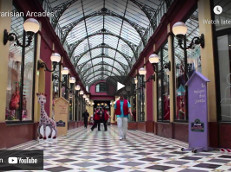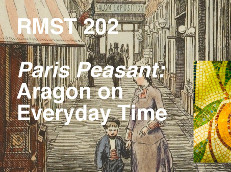Louis Aragon, Paris Peasant
Posted in Aragon lecture, Lecture Videos | Tagged with avant-garde, C20th, France, history, modernism, modernity, Paris, ruins, Surrealism, temporality, time
While reading “Paris Peasant” by Louis Aragon I was confused a lot of the time. I found it difficult to follow along with the text of the novel, as it did not seem to have much structure or storyline in my opinion. I also noticed that the beginning of the text was not very something that seemed to portray similarity to introductions of other texts that I have read in the past. I noticed that the beginning to this text was abrupt and I was confused initially at the structure of the introduction. That being said, I was able to notice that introduction or beginning of the text was quite meaningful and deep. The beginning of this text seemed to focus on life and its deeper meaning or at least that was the way that I had portrayed it. The text was very descriptive and it was slightly hard for me to follow along, but I was able to understand and interpret what was going on and how descriptive this novel was based on life. When the novel came to talking about certain buildings or places, I was pretty confused. I felt like I was not able to grasp on to the reasoning and the meaning behind the description of these places. My question about the text is what do we think makes the beginning of the novel seem so random or abrupt? During this novel, I had a hard time reading it due to the names of places being in another language. I found that I had more trouble understanding the storyline or flow of the text. I noticed that throughout this novel the author points out things in a way of including the reader in the text. This was interesting to me and helped me have an even deeper interest in the text. I wonder why the information about certain buildings or places is descriptive to the point where it talks about most fo the details you would find or observe when visiting any place. This was interesting to me as it makes me wonder what the purpose was behind the descriptiveness and if it leads to a deeper meaner or way of perceiving this text. I think that it is very interesting how descriptive this text is and I think that it adds beauty to this novel. I believe that this text allows readers to have a deeper level of understanding and meaningfulness.
Posted in Aragon, Blogs | Tagged with
While reading “Paris Peasant” by Louis Aragon I was confused a lot of the time. I found it difficult to follow along with the text of the novel, as it did not seem to have much structure or storyline in my opinion. I also noticed that the beginning of the text was not very something that seemed to portray similarity to introductions of other texts that I have read in the past. I noticed that the beginning to this text was abrupt and I was confused initially at the structure of the introduction. That being said, I was able to notice that introduction or beginning of the text was quite meaningful and deep. The beginning of this text seemed to focus on life and its deeper meaning or at least that was the way that I had portrayed it. The text was very descriptive and it was slightly hard for me to follow along, but I was able to understand and interpret what was going on and how descriptive this novel was based on life. When the novel came to talking about certain buildings or places, I was pretty confused. I felt like I was not able to grasp on to the reasoning and the meaning behind the description of these places. My question about the text is what do we think makes the beginning of the novel seem so random or abrupt? During this novel, I had a hard time reading it due to the names of places being in another language. I found that I had more trouble understanding the storyline or flow of the text. I noticed that throughout this novel the author points out things in a way of including the reader in the text. This was interesting to me and helped me have an even deeper interest in the text. I wonder why the information about certain buildings or places is descriptive to the point where it talks about most fo the details you would find or observe when visiting any place. This was interesting to me as it makes me wonder what the purpose was behind the descriptiveness and if it leads to a deeper meaner or way of perceiving this text. I think that it is very interesting how descriptive this text is and I think that it adds beauty to this novel. I believe that this text allows readers to have a deeper level of understanding and meaningfulness.
Posted in Aragon, Blogs | Tagged with
The Paris Peasant by Louis Aragon is a wonderful culmination of intricate surrealism and elaborate imagery. I found myself deep…
Posted in Aragon, Blogs | Tagged with Surrealism
The first thing one discovers when reading this work is that it is not a traditional novel. It reads more like a travelogue or a meditation on the peculiar magic and mystery of place. The Passage de l’Opera seems to serve as a repository of memories, desires, fashions, etc. His meticulously detailed descriptions of cafes, […]
Posted in Aragon, Blogs | Tagged with Magic, Mystery, Place
Initially, I was very lost on reading Paris Peasant. Often times, I tend to look too deep into a text to fully try to analyze what it is meant but it always leads me into overthinking the context. While reading Aragon’s “Paris Peasant”, I tried to keep an open mind, not letting myself get too […]
Posted in Aragon, Blogs | Tagged with
Louis Aragon’s Paris Peasant, at first glance, presents a deceiving title. On the surface it rings true: the main character is a middle class Parisian, a wanderer who is afforded the luxury to observe social institutions, characters and machinations, rarely without comment. Yet when peeling back the many layered onion that is the surrealist novel, […]
Posted in Aragon, Blogs | Tagged with Entries, renaissance, revolution, Surrealism




